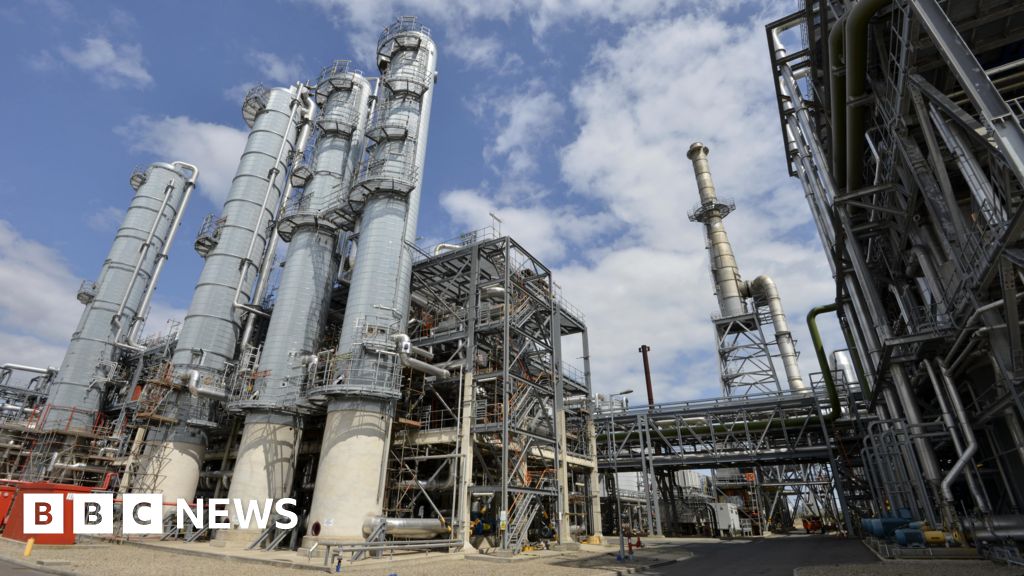A bioethanol plant will be forced to close "imminently" unless the government acts, according to its operator. Ensus, which runs the Redcar plant, said the recent UK-US tariff deal "fundamentally undermined its business position", as it removed a 19% tariff on US ethanol imports. The firm's chairman Grant Pearson said the government needed to come up with a "urgent" solution to save skilled jobs in the region. A Department for Business and Trade (DBT) spokesperson said it was working closely with the bioethanol industry to understand the impacts of the deal. The company's warning follows asimilar announcementmade by Associated British Foods (ABF), which operates the only other bioethanol plant in the UK. It said thenew deal, which is still being worked on, was the "final blow" to its Vivergo Fuels Site at Saltend, near Hull. The two plants produce bioethanol, which is blended with petrol to produce more environmentally friendly fuels, such as E10 petrol in the UK. Ensus's Redcar plant sources feed grain from farms in the UK and Europe to produce about 400 million litres (88 million gallons) of bioethanol each year. It also sells the byproducts from this process, such as high protein animal feed, to farmers. The firm said it employed more than 100 people at the plant and that it supported a wider supply chain of about 3,000 people in northern England. It is understood the influx of US produced bioethanol into the UK would severely undercut Ensus and ABF's businesses. Mr Pearson said the loss of the Teesside plant would also mean a "catastrophic knock-on effect in other vital sectors of the economy". The UK is already the second-highest destination for US ethanol exports, according to US ethanol lobby group Renewable Fuels Association. Its head Geoff Cooper said in May: "We are excited about the prospects of expanded market access that will help boost our farm economy, while also delivering lower-cost, cleaner fuel to UK drivers." US commerce secretary Howard Lutnick said on X on Thursday that he was looking forward to the UK-US deal becoming "simultaneously active in the coming days". Follow BBC Tees onX,Facebook,NextdoorandInstagram.
US deal 'may force UK biofuel plant to close'
TruthLens AI Suggested Headline:
"Closure Threatens UK Bioethanol Plant Following US Tariff Deal"
TruthLens AI Summary
The operator of the Ensus bioethanol plant in Redcar has issued a stark warning that the facility will be forced to close imminently unless urgent government intervention occurs. This announcement follows the recent UK-US tariff agreement, which eliminated a 19% tariff on US ethanol imports, significantly undermining the economic viability of the plant. Grant Pearson, chairman of Ensus, emphasized the need for immediate action to preserve the skilled jobs that the plant supports. The Department for Business and Trade (DBT) has acknowledged the situation, stating that it is working closely with the bioethanol industry to assess the impact of the new trade deal. This development mirrors a similar concern raised by Associated British Foods (ABF), which operates the only other bioethanol facility in the UK, the Vivergo Fuels Site, indicating that the new tariff arrangement could be detrimental to both plants.
The Ensus plant plays a crucial role in the production of bioethanol, generating approximately 400 million liters (88 million gallons) annually, all sourced from feed grain procured from local farms. The facility not only produces bioethanol but also supplies high-protein animal feed as a byproduct, supporting a broader supply chain that employs around 3,000 individuals across northern England. The potential influx of US bioethanol into the UK market poses a significant threat, as it may severely undercut the operations of both Ensus and ABF, leading to dire consequences for the local economy. Pearson warned that the closure of the Teesside plant would have a catastrophic ripple effect across various sectors. The UK is already a major market for US ethanol, and with ongoing negotiations to further enhance market access, US officials are optimistic about the implications for their agricultural and energy sectors. The urgency of the situation highlights the delicate balance between international trade agreements and the sustainability of local industries.
TruthLens AI Analysis
You need to be a member to generate the AI analysis for this article.
Log In to Generate AnalysisNot a member yet? Register for free.
